Belinda Read online
Page 53
“Hey, Ash!” Marty said, gesturing for silence. “Hey, no need to address these remarks to Jeremy, hey, Belinda’s a smart girl, aren’t you, sweetheart? Belinda knows what we’re talking about.” His voice had changed suddenly with the last phrase. He turned to Belinda. Silence. Silence with Ash sitting there with his fingers laced together on his knee. And me saying nothing as I watched all of them.
“Honey,” Marty said, “do this for Bonnie. That’s what I’m asking. We can cut the crap, honey. Do this to straighten things out.”
Belinda didn’t answer. But she had lost the shocked look utterly now. She was looking through the French doors at the garden, at the distant green house maybe. It almost seemed that she hadn’t heard Marty. That she was alone in the room.
Marty was looking at me. No expression really, just looking, the face amazingly calm compared with the body, which had the look of an animal about to pounce.
“Let me talk to Jeremy alone a moment, Marty,” Belinda said. She got up and I went with her into the hallway. But she didn’t say anything to me. She just looked at me, as if she expected me to talk, and so I did. I put my hands on her shoulders.
“You remember what Ollie Boon said to you about power,” I said “—all you wrote to me in your letter about that?”
She nodded. The numbed expression had definitely melted, and her eyes were quick though not untroubled. She waited for me to go on.
“Honey, he was right,” I said. “You don’t like to have power over people. And you don’t like to use it.”
Again she nodded, but she did not give anything back. She was studying me, and as always, with her hair pulled back and up into the tight braids, her face had a simultaneous innocence and determination.
“But I think this is a time,” I said, “when you can go against that inclination again, and use the power that you have.” Again no response.
“I know what you’re thinking,” I said. “You’re thinking about G.G. and the rumors. You’re thinking about the call you made to your mom.”
“And about you, Jeremy,” she said. “What they tried to do to you, too.”
“I know. And nobody’s going to blame you, honey, whatever you decide. But what I’m saying is, if you do this, if you just do what they want and make it all right for them—two episodes of this ‘Champagne Flight’ thing—well, then, all your life you’ll know you got them off the hook and what happens to them after this is their affair.”
Her face registered the most subtle surprise. It brightened visibly. It was like watching morning sun slowly fill a daylighted room.
“You mean you’re saying do it?’ she asked me. Amazement just like when we were riding in the van out of San Francisco only a few nights ago.
“Yes, I guess I am. Bail them out. And then you really can just turn on your heel and walk away.”
She looked up at me, wonderingly, confused.
“I thought you wouldn’t want me to do it,” she said. “I thought you would never forgive me, never understand.”
“Look, as it stands, there’s still a chance to get everybody our of this in one piece—and then we’ll all be free.”
“Oh, Jeremy,” she whispered. She stood on tiptoe and kissed me. “Thank God.”
And for the first time since she’d come hack, I thought I saw the radiance of my Belinda. The anxiety and the darkness were almost gone.
BONNIE was waiting in the dark limousine just inside the gates. And when we went outside, we saw that Alex was with her. He was sitting in the backseat with the door open, talking to her, and I heard him say, “Excuse me, darlin’,” as he got out.
I stood with Ash as Belinda and Marty went towards the car, and then Marty got in. Alex had come to join us and Alex shook Ash’s hand and said how beautiful Bonnie looked, that she was really a vision, and Ash said what a pleasure it was to see Alex, always a pleasure, of course.
Marty was now getting out of the car. He looked at Belinda, who was standing there waiting, her braids twisted a little as they came down to her shoulders, her head slightly bowed. He reached out to touch Belinda’s arm.
“Get in and talk to her, honey,” he said.
I felt myself tense all over as Belinda got into the car. I walked down the gravel path slowly until I could hear her voice, thin and low, but distinct nevertheless.
“Hi, Mom.”
“Hello, darlin’.”
“You feeling better now, Mom?”
“Yes, darlin’, thank you. I’m so glad you’re all right.”
“Mom, is it OK if maybe, to smooth things over, you know, that I could be in one of the shows?”
“Sure, darlin’, that would be nice, just real nice.”
“You know, just a small part. They were talking about maybe me and Alex Clementine—”
“Sure, darlin’, whatever you want.”
Another car, a shiny little BMW, was nosing up the drive. It came to a halt on the other side of the open gate, and Marty made a gesture to the men inside. Three of them got out. They were photographers, one with the old-fashioned accordion-style camera, the other two with Nikons and Canons on black straps around their necks.
Then Marty asked Bonnie and Belinda to step out of the limo, and Belinda came out first and then helped Bonnie, who blinked and lowered her head as she stepped into the bright sun.
A vision she was, truly, even her pallor was exquisite, set off by the vivid red of her carefully tailored wool suit. Her hair was a sleek mass of black silk curving just at the shoulders. Through the thick lenses of her glasses, she appeared to look past us, unseeing, as she put her arm around Belinda’s waist. Belinda slipped her arm around her mother. Belinda inclined her head towards her mother ever so slightly. And the photographers went to work.
It couldn’t have taken three minutes. The yard was deadly quiet except for the snapping and grinding of the cameras. Then the men got back into the car, and the BMW made a sharp U-turn and drove away.
Belinda helped her mother back into the car and sat beside her again.
And I looked at Marty and realized that we were standing very close to each other, maybe no more than three feet apart. He had his arm resting on the top of the limo. And he was staring at me, maybe had been for some time. He was just looking at me in a sober, detached way, his black eyes fixed, but rather relaxed.
“Bye, Mom, it was so good to see you,” Belinda said.
“Bye, darlin’.”
I couldn’t tell whether Marty was even listening to them.
When Belinda got out of the car, he continued to look at me, and I saw him give the smallest little nod of his head. I didn’t know what it meant. Maybe I never would. But when he reached out to shake my hand, I tried to respond as best I could. We looked at each other, shaking hands, and that was all. Nothing was said.
“Thank you, sweetheart,” he said to Belinda. And he pointed his finger at her. “I promised you once I’d write a bang-up episode for you, didn’t I? Well, you wait and see.”
“Don’t make it too good, Marty,” she whispered. “I’m on my way to Rio. I don’t want to be a TV star.”
He smiled, very wide, very genuine, and then he leaned over and kissed her on the cheek.
Then the limousine was rolling out the gates and down the canyon road through the dappled sun and out of sight. I put my arm around Belinda, felt her lean against me gently, felt her head against my cheek. Belinda was watching the darkened windows, the windows we could not see through. Then she lifted her hand as if she had seen somebody, which clearly she hadn’t, and she waved.
The car was gone. Then she turned to me, and the old Belinda was suddenly looking right at me out of her face.
“Hey, Jeremy, let’s do the Rio thing,” she said suddenly, “I mean, you’re coming to Rio with us, aren’t you? I’m going to call Susan. I mean, this picture is really truly on, isn’t it? We’re going to go!”
“You bet, baby darling,” I said.
I watched her turn and all but dance
up the driveway, snapping her fingers, braids swinging.
“I mean, after, you know—what, two episodes with Mom and Marty?—then we’re off.” And she vanished into the shadows of the house.
LATE that afternoon came the inevitable press conference. It had to be announced, didn’t it? She had to sit in the den with G.G. beside her and give a statement before the inevitable video cameras and lights. They were asking as many questions about G.G.’s new salon in Beverly Hills as they were asking about the show.
Susan had come over with Sandy Miller “to watch the circus.” And Alex sat with them out on the bricks by the pool. In pearls and summer lace Sandy sat there with her long fingers curled around Susan’s arm. A tomato, is that what Belinda had called her? Sandy was a tomato, all right. And did she ever play up to Alex. Susan just watched the whole thing with a patient smile.
Alex was having a wonderful time entertaining her with stories, and then Susan kept chiding him about upsetting her “price scale” with his demands for Of Will and Shame. He teased her back, telling her she hadn’t been in this business long enough to get him to make a deal without his agent at a poolside table in his own backyard.
“You want to be remembered for ‘Champagne Flight’? I’m offering you a movie, Clementine, a bona fide movie like they used to make in the old days, remember, plot, character, style, meaning, one hour and forty-five minutes without a commercial break, you get my drift?”
I went into the living room and stood for a long time looking up at the portrait of Faye Clementine that I had painted twenty-five years ago. It still hung above the fireplace where I had put it myself before I left for San Francisco on that last day. Over the years the little mistakes I’d made in perspective had always tormented me when I saw them. But I liked the painting. I felt good about it. I always had.
And now, as I studied it—Faye’s dimpled cheek, the way her carefully modeled hand rested on the pink fabric of her dress—I felt a gentle surge of excitement that no one around me need know of, or try to understand. This wasn’t a great painting. It didn’t have the hallucinatory vibrancy of the Belinda works. But it had been a true beginning, one that I was only fully understanding now that I had come full circle to stand in front of it again.
I didn’t hear Alex come up behind me. Then he put his hand on my shoulder and when I turned, he smiled.
“Go ahead,” he said. “Say I told you so. You’ve got a right.”
“You mean our old argument? Some little old talk we had about art and money and death and life?”
“Don’t leave out the word, truth, Walker. When you don’t throw the word truth into every second sentence, I get afraid.”
“OK, it was about art, money, death, life, and truth. And now you’re telling me I was right.”
“I just didn’t know how you were so sure it was all going to turn out the way it did.”
“Sure? Me? I wasn’t sure at all.”
“I don’t believe you,” he answered. “That was Clair Clarke, your agent, on the phone right now. She’s talking to me ‘cause you won’t take her calls.”
“Right now,” I said, “I don’t need her calls.”
“—and you know what she wants, don’t you?”
“Belinda as a client. I told Belinda. Clair can wait till Belinda decides.”
“No, dear boy, though she’ll want that in the bargain, too, obviously, if she can get it. She’s getting offers for your story from all over. She wants to know if you want to sell the rights.”
“To my story!”
“Yours and Belinda’s—the whole kit and caboodle. She wants you to think it over. She doesn’t want somebody to rip it off because you’re public figures now. You know, the quickie TV movie. They can do that, using your names and all. She wants to scare them off with a major package, seven-figure deal.”
I laughed. In fact, I really came apart.
I had to sit down, I was laughing so hard. I wasn’t laughing all that loud. It was a different quality of laughter. It went way deep down inside me and it was bringing the water up into my eyes. I sat there staring at Alex.
He was grinning at me, hands in the pockets of his blue-wash pants, his pink cashmere sweater tied over his shoulders, his eyes full of mischief and pure delight.
“Tell your wife about it, Walker,” he said. “Rule of thumb in Tinseltown. Always tell your wife before turning down a major package, seven-figure deal.”
“Of course, it’s her story, too,” I said, when I was finally able to catch my breath. “Oh, you bet I’ll consult her. Just wait.”
“It worked out just like you predicted, gotta hand it to you. It really did. Must have been the right dirt in the right measure after all, don’t you think?”
But then his face darkened a little. The worried look. And it was hardly for the first time.
“Jeremy, are you really doing all right?”
“Alex, don’t worry about me, seven-figure deal or no seven-figure deal, I am just fine.”
“I know you keep saying that, Jeremy, but I’m just keeping an eye out, OK? You remember Oscar Wilde, when he’d go around with the tough young hustlers in London, he called it ‘feasting with panthers.’ Remember that, hmmm? Well, you know what this town is, Jeremy? It’s ‘phone calls from panthers, and lunching with panthers, and cocktails with panthers and “catch you later,” from panthers’—you have to watch your step.”
“Alex, you’re being deceived by appearances,” I said. “It’s not like I’m here suddenly instead of up in San Francisco with all that Victorian trash. I haven’t swapped the kiddie books for Tinseltown, it’s not like that at all. I’ve come back to some fork in the road I never should have passed up the first time around. And it hasn’t got much to do with Hollywood really. It’s got more to do with time and what’s directly in front of you and the way you use it, which is why I’m perfectly all right.”
“Now that sounds like the old Jeremy,” he said, “I have to admit. Throw a little truth into it for me and I’ll be convinced.”
He gave my shoulder a squeeze, and then he started back out to the patio, where G.G. was sitting with the ladies by the pool. The reporters were gone now. Belinda had come out, peeled off her jeans and shirt to reveal nothing but that wicked little Brazilian bikini before she carefully aimed her sleek breathtaking little body, arms first, into the pool.
Just me and Faye again. OK. I love you, Faye.
I looked up at her, and I was thinking pictures again, my kind of pictures, full of incandescent power and gradations of darkness, burning studies of Alex, Blair, G.G., and Belinda, yes, Belinda in some wholly new context, some new adventure utterly transcending what had gone before.
The contour of glitz, yes, I wanted to get it, and the discovery of the shadows that the spotlight always washed away. The color and texture of California, all that I had to do.
But these gilded images were but a small part of what was yet to come for me. The fact was, my world was now filled with a thousand beings of all ages, shapes, attitudes, a thousand settings, patterns of past and present and future unexamined and unseen before. For the first time I could do anything I wanted.
I had passed—thanks to Belinda—out of the world of dreams into the brilliant light of life itself.
The End
Anne Rampling writing as Anne Rice, California, 1986

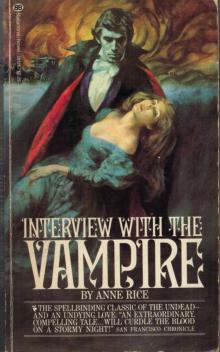 Interview with the Vampire
Interview with the Vampire Christ the Lord: Out of Egypt
Christ the Lord: Out of Egypt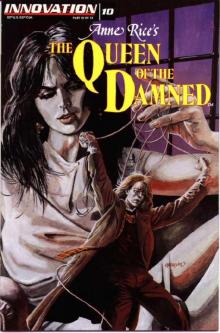 The Queen Of The Damned
The Queen Of The Damned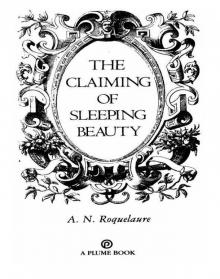 The Claiming of Sleeping Beauty
The Claiming of Sleeping Beauty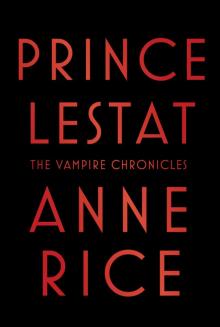 Prince Lestat
Prince Lestat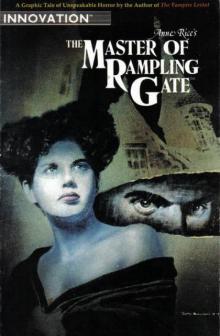 The Master of Rampling Gate
The Master of Rampling Gate The Vampire Lestat
The Vampire Lestat Blood Canticle
Blood Canticle Beauty's Release
Beauty's Release Pandora
Pandora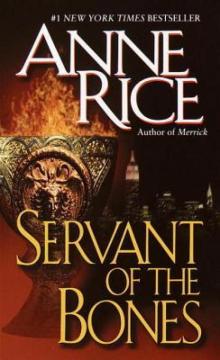 Servant of the Bones
Servant of the Bones Of Love and Evil
Of Love and Evil Beauty's Punishment
Beauty's Punishment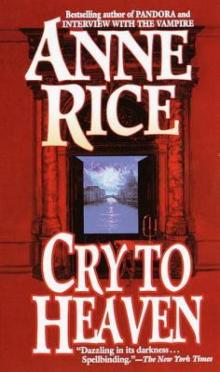 Cry to Heaven
Cry to Heaven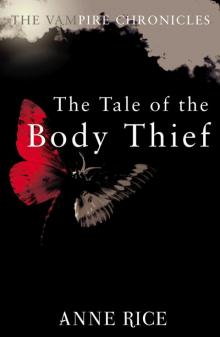 The Tale of the Body Thief
The Tale of the Body Thief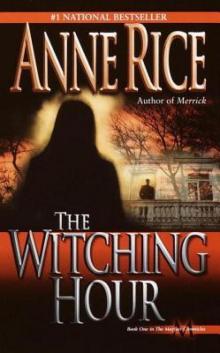 The Witching Hour
The Witching Hour Memnoch the Devil
Memnoch the Devil Blackwood Farm
Blackwood Farm Beauty's Kingdom
Beauty's Kingdom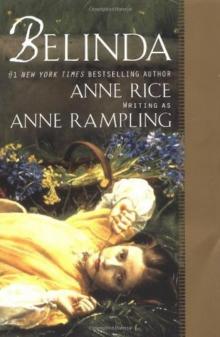 Belinda
Belinda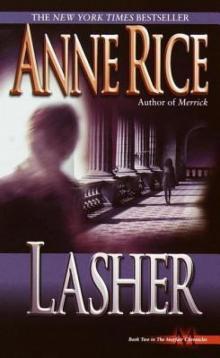 Lasher
Lasher Vittorio, the Vampire
Vittorio, the Vampire Angel Time
Angel Time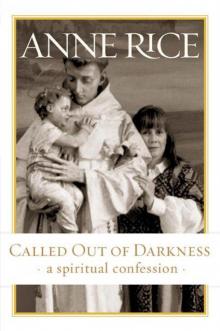 Called Out of Darkness: A Spiritual Confession
Called Out of Darkness: A Spiritual Confession Blood And Gold
Blood And Gold The Passion of Cleopatra
The Passion of Cleopatra Taltos
Taltos Exit to Eden
Exit to Eden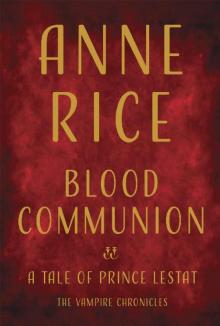 Blood Communion (The Vampire Chronicles #13)
Blood Communion (The Vampire Chronicles #13) The Wolf Gift
The Wolf Gift The Wolves of Midwinter
The Wolves of Midwinter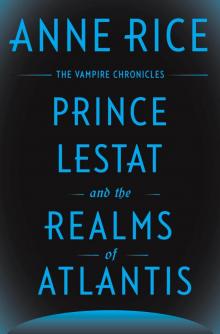 Prince Lestat and the Realms of Atlantis
Prince Lestat and the Realms of Atlantis The Ultimate Undead
The Ultimate Undead The Vampire Lestat tvc-2
The Vampire Lestat tvc-2 The Road to Cana
The Road to Cana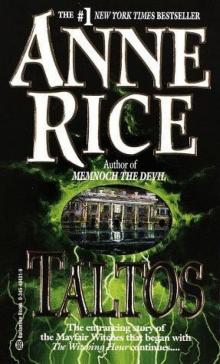 Taltos lotmw-3
Taltos lotmw-3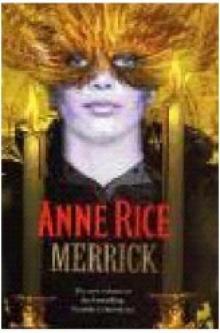 Merrick tvc-7
Merrick tvc-7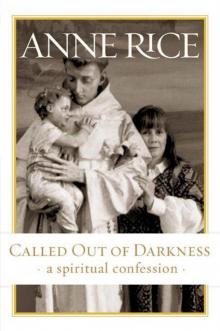 Called Out of Darkness
Called Out of Darkness Pandora - New Vampires 01
Pandora - New Vampires 01 Bllod and Gold
Bllod and Gold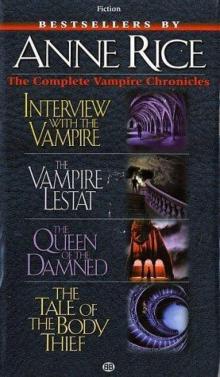 The Queen Of the Damned: Vampire Chronicles
The Queen Of the Damned: Vampire Chronicles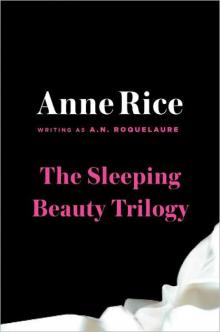 The Sleeping Beauty Trilogy
The Sleeping Beauty Trilogy The Claiming of Sleeping Beauty b-1
The Claiming of Sleeping Beauty b-1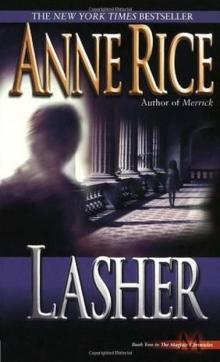 Lasher lotmw-2
Lasher lotmw-2 The Tale of the Body Thief tvc-4
The Tale of the Body Thief tvc-4 The Vampire Chronicles Collection
The Vampire Chronicles Collection Ramses the Damned
Ramses the Damned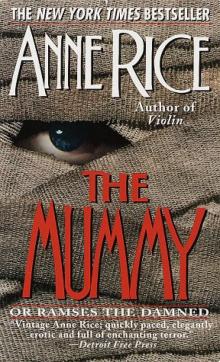 The Mummy - or Ramses the Damned
The Mummy - or Ramses the Damned Vittorio, The Vampire - New Vampires 02
Vittorio, The Vampire - New Vampires 02 The Vampire Armand tvc-6
The Vampire Armand tvc-6 Queen of the Damned tvc-3
Queen of the Damned tvc-3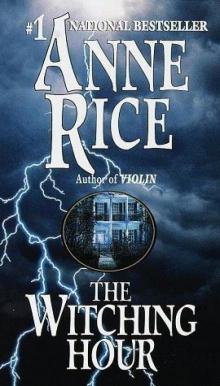 The witching hour lotmw-1
The witching hour lotmw-1 Feast of All Saints
Feast of All Saints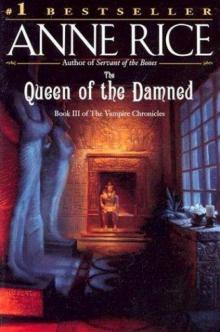 Queen of the Damned
Queen of the Damned The Wolves of Midwinter twgc-2
The Wolves of Midwinter twgc-2 The Mummy
The Mummy Blood and Gold tvc-8
Blood and Gold tvc-8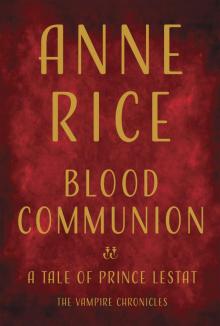 Blood Communion
Blood Communion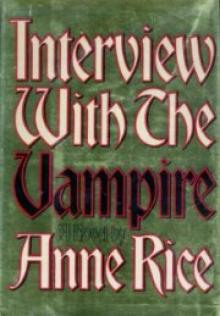 Interview with the Vampire tvc-1
Interview with the Vampire tvc-1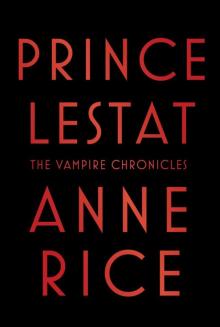 Prince Lestat: The Vampire Chronicles
Prince Lestat: The Vampire Chronicles